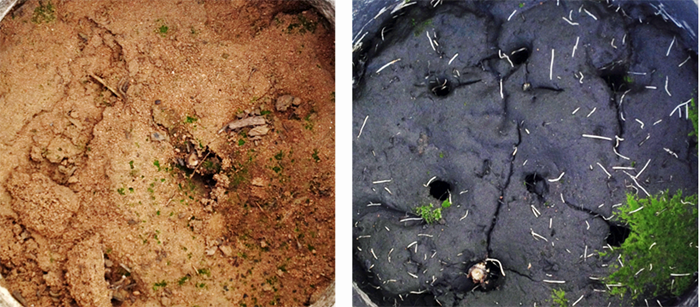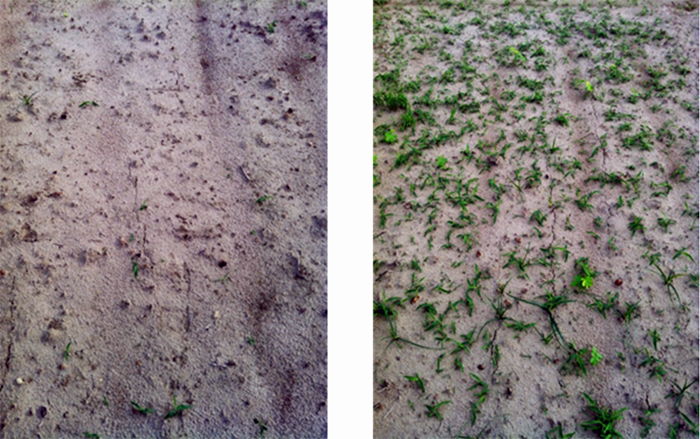By Ramon G. Leon

Figure 1. Healthy roots grow more abundantly in soil treated with biochar. The photo on the left shows soil where a soybean plant was recently harvested. The photo on the right shows the roots (white filaments) of a recently harvested soybean plant growing in the biochar treated soil. Photo Credit: Ramon Leon
Biochar is a solid byproduct of burning wood or plant residues rich in cellulose under high temperatures and low oxygen conditions. This process is called pyrolysis, and it is one of the systems that is currently used for biofuel production. Biochar is basically a very high quality and stable charcoal.
Recently, researchers found that at least 2,500 years ago, indigenous groups in Brazil were able to increase the fertility and quality of very degraded soils by incorporating biochar. These findings prompted the development of many research projects seeking ways to take advantage of biofuel production to produce biochar, and use this biochar for agricultural purposes.
Biochar provides multiple benefits. For example, it retains nutrients in the soil, reducing leaching problems. Therefore, incorporating biochar in the soil could allow reduced fertilizer rates without altering crop growth.
Joel Reyes, a graduate student in the Agronomy Department of the University of Florida, recently found that plants growing in soil with biochar will develop more roots, and those roots will be more concentrated where the biochar is located. Sometimes you can even see healthy roots growing out of the soil (Figure 1). These results suggest that biochar can be used to guide root growth within the soil making it possible to prepare the plants to better capture nutrients and water.
Because biochar supply is limited at this point, its use is currently more common in nurseries and for gardening purposes. Mixing biochar in planting beds is a practice that is quickly increasing.
Although biochar provides multiple benefits for soil quality and plant growth, our research has identified the potential of biochar to inactivate herbicides in the soil. This can be of great benefit when the goal is to limit the movement of herbicides in the soil. Therefore, if the biochar is placed below the root zone it can act as a filter that will prevent herbicides and fertilizers from reaching ground water reservoirs. However, if the biochar is placed close to the soil surface, it will bind the herbicide so tightly that there will be very little left to control weeds. This is particularly problematic in the case of preemergence herbicides. For example, Neeta Soni a graduate student in the Agronomy Department observed no herbicidal activity from pendimethalin (Prowl, Pendulum), a very effective preemergence herbicide for grass weed control, in areas that had been treated with 2 ton/ac of biochar (Figure 2). This effect has been document for several years after biochar application.

Figure 2. The left panel shows excellent weed control with pendimethalin applied at twice the label rate (as part of a research trial) on a soil without biochar. The right panel shows zero weed control after applying the same herbicide treatment on a soil in which 2 Ton biochar per acre were incorporated. Photo Credit: Neeta Soni
Everyday, scientists around the world are finding new ways to use biochar, so keep your eyes open to see whether biochar can help you improve the quality of the soil in your farm or home. But remember, if you want to use biochar, make sure that you have weed control options other than preemergence herbicides. Otherwise, the benefits of the biochar might end up benefiting the weeds.
Source:ufl.edu